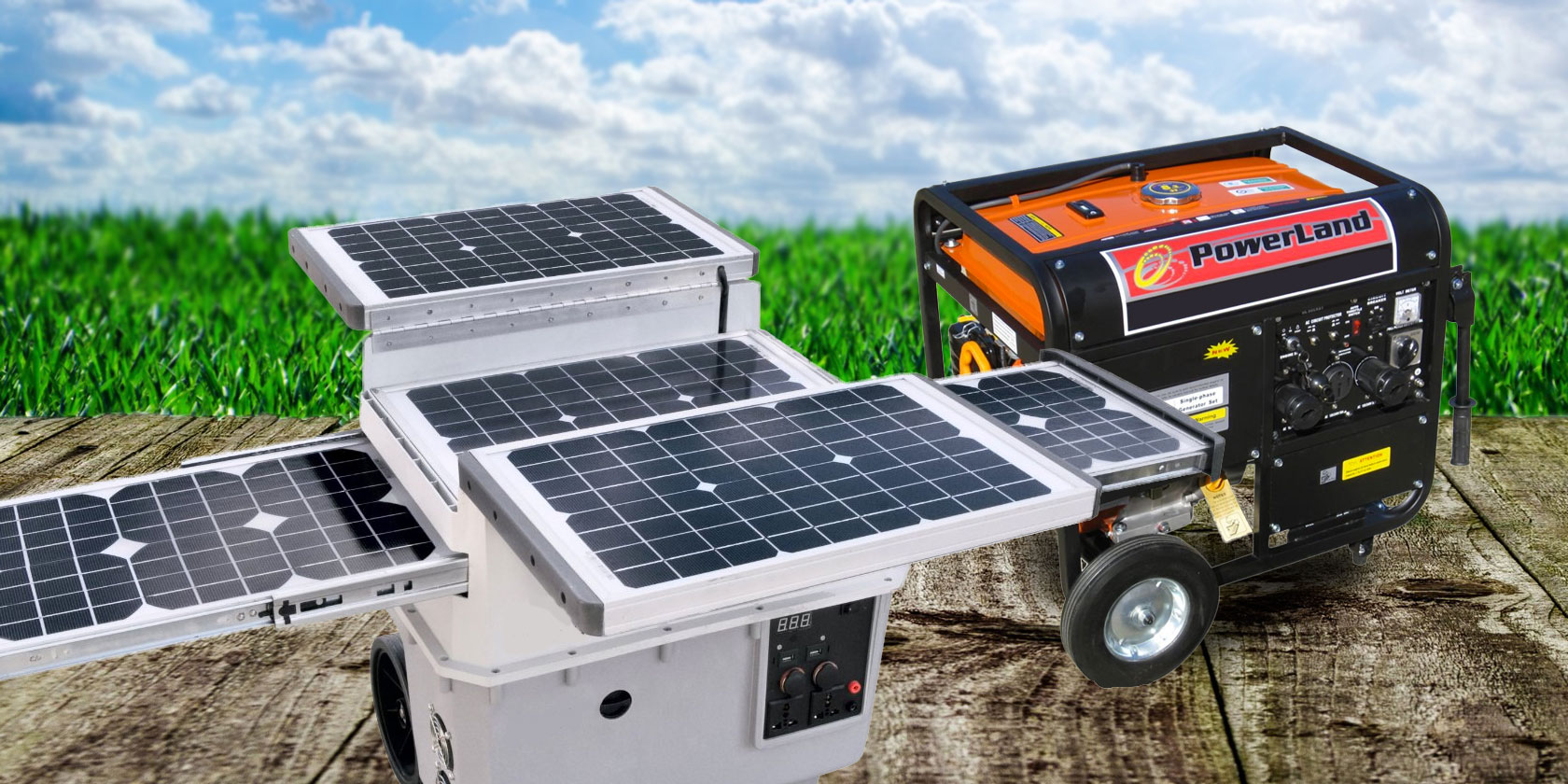
Solar power has started to go mainstream. But if you’re not quite ready to power your home primarily solar electricity, why not try using solar energy to replace your backup power?
You may already be familiar with gas or diesel powered generators. Solar generators are cleaner, safer, and may even make more financial sense. How do solar generators compare to gas generators? Let’s break down how these two types of backup energy work.
How Does a Solar Generator Work?
Solar electricity generators consist of photovoltaic (PV) panels, a charge regulator, batteries, and an inverter.
The PV panels convert sunlight into electricity and sends it off to the charge regulator.
Meanwhile, the charge regulator pumps the electricity into the batteries and stops when they are fully charged.
The PV panels provide direct current (DC) electricity, but the electronics in your home need alternating current (AC) electricity. The inverter takes the DC electricity from the batteries and converts it into AC electricity.
What are the Benefits of a Solar Generator?
- Solar electric generators are silent. Since there are no moving parts, you don’t deal with the noise that comes from a gas or diesel powered machine.
- Solar generators require less maintenance. Parts that don’t move don’t wear out so fast.
- Solar generators don’t require fossil fuels. That means energy does less damage on its way to your home, safer air to breathe, and fewer greenhouse gases.
- Once the solar generator is up to full speed, it will run day and night without any input from you. During the day, the electricity charges the batteries and excess powers your equipment. At night, the batteries power your equipment. As long as there’s enough daylight every day, it just goes on and on.
How Does a Gas Generator Work?
A gas generator converts the chemical energy of gasoline into mechanical energy and then into electrical energy.
It does this using an engine and an alternator. The gas combusts in the engine, turning the crankshaft just like in a car. Instead of turning the wheels of a car, though, it turns the rotor in the alternator.
The rotor is a coil of copper wire. The copper wire spins past stationary magnets. As copper wire passes over magnets, the magnets induce a slight electrical charge in the wire. Do this very fast and you generate a significant amount of electricity. It’s a fairly complex system with lots of moving parts.
What are the Benefits of a Gas Generator?
- Gas generators can be really compact and still put out a large amount of electricity relative to solar power.
- Gas generators are easy to operate and get going. Fill with gas, pull the cord or press the starter button, and you’ve got power. As long as you can keep putting gas in it, it’ll keep running and putting out a lot of power.
- Gas generators require less space. It only takes one or two people to load most home-use generators in the back of a truck, and there remains plenty of room for other things.
- Gas generators are mass-produced and pretty simple to build, so they are less expensive than solar generators of the same ability.
Which Type of Generator Do You Need?
There are so many different situations where you might need a generator that it’s impossible to cover them all. What we can do is take a look at a couple different scenarios.
Scenario One: Backup Power for Power Outages

You’re thinking about being prepared for the next big hurricane or blizzard. You want to make sure that if the power goes out, you can run the most necessary things in your house, like a heater and some lights. You may not have a lot of space to work with. Maybe you’ve got a small yard or just a balcony.
Here you want something that’s easy to store and quick to set up. You want to put out a few thousand Watts at 2 Amps or more. You want it to work right now and for as long as necessary. Hopefully, that’s no more than a day or two. When the grid power comes back, you can pack it up and get it out of the way.
In this scenario, the gas generator shines. A gas generator that would do the job is about the same size as a large luggage bag or maybe a footlocker. If you know the storm is coming, you can get a jerry can or two of gas to have on hand.
All it takes to set it up is to put it near enough to your home to run an extension cord, but far enough that the exhaust fumes don’t come into the house. The gas generator will instantly provide enough power to run your most necessary things, and maybe a few nice-to-haves as well.
Once the storm is done and the power is back up, you simply turn it off, let it cool down, drain the gas that’s left, and put it back into storage. Sure, they need a little maintenance every now and again, but nothing more than a gas-powered lawn mower needs.
Scenario Two: Camping with the Family

You’ve got a small travel trailer, maybe even just a tent. You and the family go camping for maybe a week or two every summer. You don’t really need any electrical devices, but it’d sure be nice to have a little TV for the rainy days, and have a little more light at night.
Maybe you need to keep a phone charged just in case there’s an emergency back in the urban world. You need maybe a few hundred watts at under 2 Amps. All you want to do is enjoy this great planet and hear yourself think, or not think. Whichever.
In this scenario, the solar generator makes the most sense. Once you get to your campsite, you will spend a little longer setting it up than a gas generator. But once it’s set up, you can forget about it. It’ll spend the rest of the day gathering sunlight and making electricity for you.
A solar generator will give you the power you need for those twilight hours and it will do so with complete silence. Now you can listen to the call of the loons, breathe the fresh air, and have enough light for some fun shadow puppet time with the kids.
The next time you even think about the generator is when you’re packing it up to put in the SUV and head home. No fuel to drain, no jerry cans to lug, no gas smell in the car for the next three weeks. And you’ve left the campsite closer to how you found it.
What Size Generator Will Supply Enough Power?
Now that you know what kind of generator you want, you can figure out what size of generator will do the job. To figure that out, you will need to understand a bit about generator ratings.
Gas or solar generators are rated in different ways. You want to know the peak Amperage either can handle. For gas generators, you’re eyeing their Wattage (W) rating. Often, the Watts will be in the thousands so it’s expressed as Kilowatts (kW).
For solar generators, you’re looking for the Amp hour (Ah) rating, because the electricity generally comes out of a battery.
Now, what do those things mean?
Amps, Amp-hours, and Watts
- An Amp (A), or Ampere, is the unit of measure for electrical current. The electrical current is the rate of flow—how much can flow at once. To calculate the peak Amps you’ll need, find out the Amp rating of all the devices you’d want to run, add them up, and then look for an Amp rating that could run them all at once. The calculation looks like this: Item 1 Amps + Item 2 Amps + Item 3 Amps … = Total Amps
- An Amp hour is how much electricity can flow from the battery at a usable voltage, typically for a 20 hour period. You’ll often see it expressed as something like 100Ah. Divide that 100Ah by 20 hours. You’re left with 5A. The calculation looks like this: 100Ah ÷ 20h = 5A for 20 hours
- A Watt (W) is the unit of measure for the amount of work 1 Volt (V) of electricity at 1 Amp (A) can do per second. Here’s the calculation: 1 Volt x 1 Amp = 1 Watt
When considering Watts, be careful! Usually the Wattage rating that you first see is how many running Watts the generator can handle. Some electrical devices have a starting Watt rating that’s much higher than its running Wattage. For example, a dishwasher may run at 1200W but require 3000W to start up. Make sure your gas generator can handle bursts like that.
Maybe You Don’t Need So Much Power
If you’re just trying to power a laptop and a phone, a full-blown solar or gas generator can be overkill. Fortunately solar power now comes in many different forms. Just like there are small portable external battery packs for your phone, there are larger car battery-sized options that can power more. Or you can find panels built directly into flashlights that double as external battery packs. There are many ways now to generate power at home or in the field.
Read the full article: Solar Generators vs. Fuel Generators: Which One Is Best for You?


